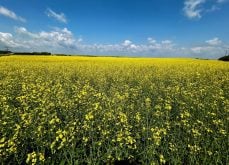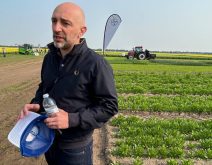SASKATOON — British Columbia is making history by becoming the first jurisdiction in North America to implement a sustainable aviation fuel mandate.
There are hundreds of planes in the air today using SAF, and the fuel is available at more than 100 airports.
“But for these alternatives to be manufactured at scale, fuel producers need assured markets, and that’s where B.C.’s leadership, again, is so critical,” Ian Thomson, president of Advanced Biofuels Canada, said in a news release.
California, which has been a leader in setting low carbon fuel standards, is in the midst of consultations about setting an SAF mandate.
Read Also

Canola oil transloading facility opens
DP World just opened its new canola oil transload facility at the Port of Vancouver. It can ship one million tonnes of the commodity per year.
“B.C. is a little ahead of the game,” he said.
“It’s great news.”
The first component of the new regulation comes into effect in 2026 when fuel suppliers are required to decrease the carbon intensity of their product by either physically incorporating SAF into their fuel or creating carbon offsets elsewhere.
The carbon intensity requirement starts at a two percent reduction in 2026, rising to 10 percent by 2030.
Offsets can be generated by selling increased amounts of other types of biofuels, such as ethanol, biodiesel or renewable diesel or by purchasing credits on the open market.
However, in 2028 there is an actual physical, volumetric requirement. Fuel suppliers will need to incorporate one percent SAF into their fuel by 2028, two percent by 2029 and three percent by 2030.
That would amount to 22 million litres of SAF in 2028, 44 million litres in 2029 and 66 million litres in 2030.
“It’s not large,” said Thomson.
“It’s a pretty modest inclusion rate.”
The volumes are considered appropriate given today’s limited SAF production capacity, and it sends a signal to manufacturers that governments are getting serious about the fuel.
Parkland’s refinery in Burnaby, B.C., produces small volumes of jet fuel, and the Imperial Oil renewable diesel plant under construction near Edmonton will also make the fuel.
SAF can be made using the same feedstocks as renewable diesel, which includes canola oil.
But initially, the SAF will likely be imported from Asia due to limited Canadian supplies.
Thomson said B.C.’s SAF targets are “gradual, achievable and affordable.” By 2030 it is expected to add 1.5 percent to the cost of a typical three-hour flight out of Vancouver International Airport. That amounts to an extra $3 on the average ticket price.
While he is pleased with B.C.’s announcement, Thomson was disappointed by the lack of a federal response to subsidies contained in the U.S. Inflation Reduction Act in the recent Fall Economic Statement 2023.
He was hoping Ottawa would announce investment tax credits and other fiscal supports for Canadian manufacturers to combat the looming U.S. production tax credits of up to US$1 per gallon for renewable diesel and $1.75 for SAF.
However, there was nary a mention in the statement.
“There’s a big push right now to make sure that it does show up in Budget 2024,” he said.
Thomson said the federal government is pouring billions of dollars into carbon capture and storage projects for fossil fuel that will achieve a fraction of the reduction in greenhouse gases that clean fuels can generate.
Meanwhile, some clean fuel projects intended for Canada have pulled out and are heading south of the border to the United States.
“Canada has got to decide whether it wants to have these fuels produced here or not,” he said.
“That’s what we’re down to.”


















